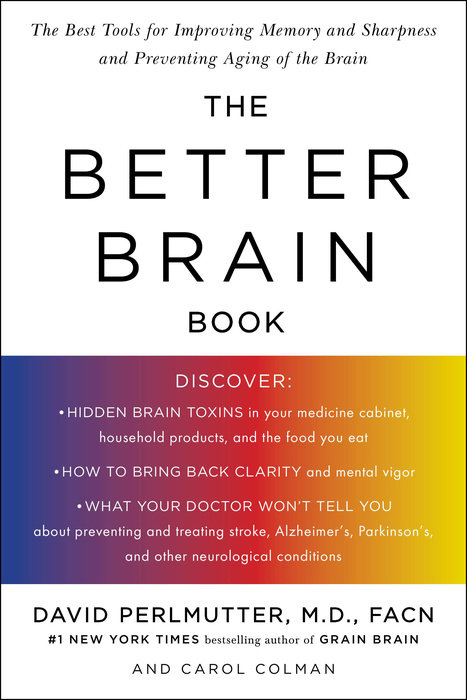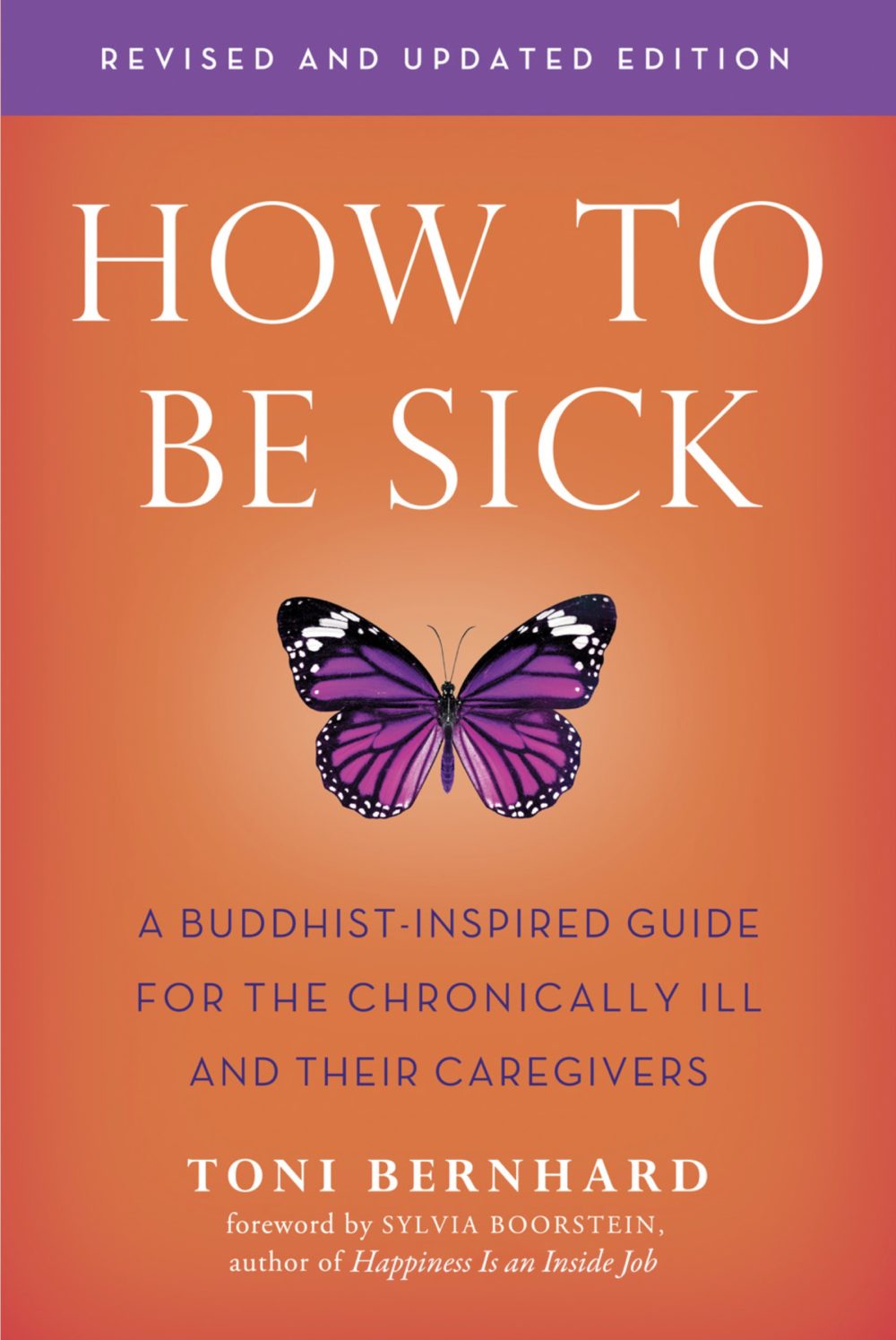
The Better Brain Book: The Best Tool for Improving Memory and Sharpness and Preventing Aging of the Brain

By David Perlmutter, Carol Colman — 2005
Celebrated neurologist David Perlmutter reveals how everyday memory-loss—misplacing car keys, forgetting a name, losing concentration in meetings—is actually a warning sign of a distressed brain. See more...
FULL SUMMARY
Celebrated neurologist David Perlmutter reveals how everyday memory-loss—misplacing car keys, forgetting a name, losing concentration in meetings—is actually a warning sign of a distressed brain. Here he and Carol Colman offer a simple plan for repairing those problems, clarifying misconstrued connections between memory loss and aging, and regaining and maintaining mental clarity by offering the tools for: Building a better brain through nutrition, lifestyle changes, and brain workouts. Coping with specific brain disorders such as stroke, vascular dementia, Alzheimer's, Parkinson's, multiple sclerosis, and Lou Gehrig's disease. Understanding risk factors and individually tailoring a diet and supplementary program.
YOU MIGHT ALSO LIKE
CLEAR ALL
BY TOPIC
BY TYPE
FILTER

TOPIC
- Brain Health (30)
- Dementia (24)
- Physical Health (23)
- Healing Approaches (20)
- Mind-Body Connection (20)
- Illness and Injury (17)
- Emotional and Mental Health (16)
- Athlete Well-Being (15)
- Chronic Health Conditions (15)
- Compassion Fatigue (15)
- Healthy Eating (15)
- Cancer (13)
- Living with Illness (13)
- Longevity (12)
- Memory (12)
- Self-Care (11)
- Self-Healing (11)
- Retirement (10)
- Anxiety (9)
- Offering Support to Others (9)
- Science and Spirituality (9)
- Well-Being (9)
- Buddhism (8)
- Integrative Medicine (8)
- Transitions (8)
- Depression (7)
- Facing Own Death (7)
- Neuroplasticity (7)
- Self-Discovery (7)
- Imagination and Creativity (6)
- Midlife Crisis (6)
- Mindfulness (6)
- Parenting (6)
- Search for Purpose (6)
- Trauma Healing (6)
- Addiction (5)
- Autoimmune Disease (5)
- Cognition (5)
- Energy Healing (5)
- Epigenetics (5)
- Finding Meaning (5)
- Honoring Emotion (5)
- Inflammation (5)
- Love (5)
- Memoir (5)
- Neurodiversity (5)
- Self-Compassion (5)
- Sleep (5)
- Stress (5)
- Trauma (5)
- Weight Concerns (5)
- Women’s Well-Being (5)
- Child’s Emotional Growth (4)
- Chronic Pain (4)
- Compassion (4)
- Consciousness (4)
- Death and Dying (4)
- Exercise (4)
- Naturopathy (4)
- Neuropsychology (4)
- Peak Performance (4)
- Psychology (4)
- Resilience (4)
- Romantic Relationships (4)
- Self-Reflection Practices (4)
- Stress Management (4)
- Veganism (4)
- Addiction Recovery (3)
- Anger (3)
- Asking for Help (3)
- Chronic Fatigue (3)
- Emotional Intelligence (EQ) (3)
- Empathy (3)
- Family Dynamics (3)
- Fellowship and Community (3)
- Functional Medicine (3)
- Grief (3)
- Habit Formation (3)
- Happiness (3)
- Human Potential (3)
- Inner Peace (3)
- Joy (3)
- Learning Styles (3)
- Letting Go (3)
- Lifestyle Medicine (3)
- Meditation (3)
- Mindfulness Practices (3)
- Nutritional Medicine (3)
- PTSD (3)
- Sacred Feminine (3)
- Self-Acceptance (3)
- Sex (3)
- Spiritual Growth (3)
- Taoism (3)
- Vegetarianism (3)
- A Course in Miracles (2)
- Autism (2)
- Awareness (2)
- Ayurveda (2)
- Belonging (2)
- Body Positivity (2)
- Changes in Libido (2)
- Child’s Trauma (2)
- Children’s Well-Being (2)
- Cognitive Psychology (2)
- Connection (2)
- Death or Loss of a Loved One (2)
- Death or Loss of a Parent (2)
- Decision Making (2)
- Digital Life (2)
- Disabled Well-Being (2)
- Dysfunctional Childhood (2)
- Eating Disorders (2)
- Endurance (2)
- Fasting for Health (2)
- Female Empowerment (2)
- Forgiveness (2)
- Freedom (2)
- Friendship (2)
- Grace (2)
- Hope (2)
- Identity (2)
- Inner Life (2)
- Intimacy (2)
- Jungian Analysis (2)
- Kindness (2)
- Loss of Appetite (2)
- Marriage (2)
- Mental Health Challenges (2)
- Negative Self-Talk (2)
- Plant-Based Medicine (2)
- Polyvagal Theory (2)
- Pregnancy and Childbirth (2)
- Problem Solving (2)
- Qigong (2)
- Relationship Challenges (2)
- Relationship with Money (2)
- Religious Experience (2)
- Reproductive Health (2)
- Rolfing (2)
- Self-Actualization (2)
- Self-Love (2)
- Self-Mastery (2)
- Self-Reliance (2)
- Somatic Experiencing (2)
- Spiritual Development (2)
- Spiritual Practices (2)
- Sudden Weight Change (2)
- Synesthesia (2)
- Trauma-Informed Therapy (2)
- Willpower (2)
- Yoga (2)
- Young Adult Well-Being (2)
- Acceptance (1)
- Accepting Love (1)
- Activism/Service (1)
- Adaptability (1)
- ADD/ADHD (1)
- AIDS (1)
- Alcohol Addiction (1)
- Altered States (1)
- Anger Management (1)
- Anorexia (1)
- Archetypes (1)
- Attachment Theory (1)
- Binge Eating (1)
- Biofeedback (1)
- Biohacking (1)
- Body Image (1)
- Bodywork (1)
- Breathwork (1)
- Building Character (1)
- Bulimia (1)
- Burnout (1)
- Challenges with Teens (1)
- Child’s ADD/ADHD (1)
- Child’s Challenging Behavior (1)
- Chronic Anxiety (1)
- Clinical Depression (1)
- Conscience (1)
- Creative Well-Being (1)
- Death or Loss of a Sibling (1)
- Disconnection (1)
- Divorce and Breakup (1)
- Dreamwork (1)
- Drug Addiction (1)
- Emotional Labor (1)
- Energy Balancing (1)
- Fatherhood (1)
- Fatigue (1)
- Fear (1)
- Focus (1)
- Global Challenges (1)
- Global Food Supply (1)
- Goddess (1)
- Gratitude (1)
- Grit (1)
- Guided Meditation (1)
- Holism (1)
- Homeopathy (1)
- Identity Shifts (1)
- Immortality (1)
- Indigenous Healing Approaches (1)
- Infidelity (1)
- Inner Strengths (1)
- Insomnia (1)
- Intention (1)
- Journaling (1)
- Judaism (1)
- Ketogenic Diet (1)
- Kids and Sports (1)
- Life Challenges (1)
- Loneliness (1)
- Loss of Partner/Spouse (1)
- Lovingkindness Meditation (1)
- Managing Energy (1)
- Massage (1)
- Mentoring (1)
- Moral Philosophy (1)
- Motherhood (1)
- Nightmares (1)
- Obsessions/Compulsions (1)
- Optimism (1)
- Past Lives and Reincarnation (1)
- Perception (1)
- Play (1)
- Positive Self-Talk (1)
- Productivity (1)
- Psychedelic Research (1)
- Psychedelic-Assisted Therapy (1)
- Psychological Approaches (1)
- Psychology and Spirituality (1)
- Qi (1)
- Quantum Physics (1)
- Reiki (1)
- Relationship with Time (1)
- Rest (1)
- Self-Development (1)
- Self-Expression (1)
- Self-Pressure (1)
- Self-Realization (1)
- Self-Reckoning (1)
- Setting Limits and Boundaries (1)
- Sexual Health (1)
- Shadow (1)
- Sleep Disorders (1)
- Social Media Addiction (1)
- Spiritual Awakening (1)
- Spiritual Healing (1)
- Spiritual Quest (1)
- Spirituality and Health (1)
- Suffering (1)
- Superfoods (1)
- Telepathy (1)
- The Feldenkrais Method (1)
- Tibetan Buddhism (1)
- Time Management (1)
- Traditional Chinese Medicine (1)
- Transcendent Experience (1)
- Transformation (1)
- Unfulfilled Career (1)
- Visualization (1)
- Wake-Up Calls (1)
- Work Challenges (1)
- Zen Buddhism (1)
FILTER

TEACHER
- Marion Nestle (3)
- Bernie S. Siegel (2)
- Daniel J. Siegel (2)
- David Perlmutter (2)
- Donna Jackson Nakazawa (2)
- Gabor Maté (2)
- Gary Taubes (2)
- Helen Fisher (2)
- Howard Gardner (2)
- Ken Dychtwald (2)
- Lisa Feldman Barrett (2)
- Mark Hyman (2)
- Peter A. Levine (2)
- Richard Davidson (2)
- Rick Hanson (2)
- Sanjay Gupta (2)
- Stephen Porges (2)
- Thomas Moore (2)
- Amit Goswami (1)
- Andrew Solomon (1)
- Angeles Arrien (1)
- Anna Lembke (1)
- Annie Hopper (1)
- Bessel van der Kolk (1)
- Chip Conley (1)
- Christy Harrison (1)
- Connie Zweig (1)
- Dan Buettner (1)
- Daniel Goleman (1)
- David Spiegel (1)
- Diane Ackerman (1)
- Diane Stein (1)
- Elizabeth Lesser (1)
- Ellen Langer (1)
- Elson Haas (1)
- Erin Clabough (1)
- Ervin László (1)
- Frans Stiene (1)
- Gerald Jampolsky (1)
- Gloria Steinem (1)
- Hildegard von Bingen (1)
- Ida Rolf (1)
- James Hillman (1)
- James Hollis (1)
- Jane E. Brody (1)
- Jane Roberts (1)
- Joan Borysenko (1)
- Joan Chittister (1)
- Joel Fuhrman (1)
- Joel Kahn (1)
- John Sarno (1)
- Julia Cameron (1)
- Karen Casey (1)
- Ken Wilber (1)
- Larry Dossey (1)
- Lissa Rankin (1)
- Louise Hay (1)
- Marc Ian Barasch (1)
- Marianne Williamson (1)
- Martin Seligman (1)
- Matthieu Ricard (1)
- Michael Pollan (1)
- Michio Kaku (1)
- Oliver Sacks (1)
- Ondrea Levine (1)
- Parker J. Palmer (1)
- Queen Afua (1)
- Ram Dass (1)
- Ruby Wax (1)
- Rudolph Ballentine (1)
- Shauna Shapiro (1)
- Stan Tatkin (1)
- Stephen Levine (1)
- Sylvia Boorstein (1)
- Tara Stiles (1)
- The Dalai Lama (1)
- Thubten Chodron (1)
- Toni Bernhard (1)
- Vicki Culpin (1)
- Zalman Schachter-Shalomi (1)








